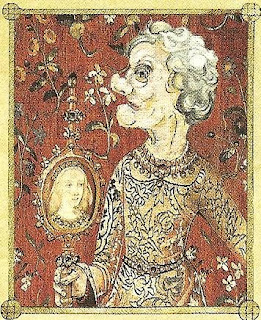
The best of plays, the . . .
I recently returned from my summer trip to Ashland, Oregon, for the Shakespeare Festival. Ashland is always a pleasant place to be, with great places to hang out (Lithia Park and the coffee shop above the bookstore) and fascinating theatrical works to enjoy. This season was no exception.
HAMLET. This was the piece de resistance of the entire festival, in my opinion. The play, directed by Bill Rauch, was innovative, surprising, and memorable: the best production of Hamlet I have ever seen. To begin with, it was set in “modern” times, which lent an eerie resonance to the underlying political plot: a good leader is assassinated by a reactionary dictator who then takes over the country. Consequently, Hamlet’s (played by Dan Donohue) moral dilemma is deeper than just personal revenge against his father’s murderer; it poses a universal question about what a person does when confronted with a moral evil, as in a power-mad leader.
Nuances of expression brought out the subtle ironic humor of Hamlet’s psyche, and the timing of line delivery using pauses and delays and drawing out of particular words for emphasis added yet another layer of expression. The performance was riveting.
Other innovations: The ghost sends his message from the “other” world in sign language. Rosencrantz and Guildenstern are played by women! The “Players” are a troupe of reggae-type musicians with microphones who not only sang but danced!
And Ophelia was a typical 13-year-old - - bratty, impudent and confused about the adult world. The actress (Susannah Flood) played the “mad scene” like a berserked-out druggie and she grabbed me by the throat.
The most plangent scene for me was when the live-and-let-live philosophy of Laertes (David DeSantos), which Hamlet grows to embrace as well, comes to nothing as they accidentally kill each other.
The audience gave the performance a standing ovation.
PRIDE AND PREJUDICE. Jane Austen’s book was adapted for the stage by Joseph Hanreddy and J.R. Sullivan and directed by Libby Appel. It works as a farce-y comedy, but it wasn’t Jane Austen. The play was lively, clever, and funny, very “girly,” with delicious Regency-era diaphanous gowns and biting caricatures of the amusing excesses of mother and father figures Mrs. Bennett (Judith-Marie Bergan) and Mr. Bennet (Mark Murphey). But . . .
Austen’s subtle social criticism was lost in the comic antics; her acute observations of life around her were not treated in sufficient depth. For example, the significance of Charlotte Lucas (Lisa McCormick) marrying Mr. Collins (James Newcomb) was skimmed over in favor of humorous characterization and slapstick. Likewise, the impediment to Lizzie’s (Kate Hurster) joining her life and social milieu with that of Mr. Darcy (Elijah Alexander) was left to “read-between-the-lines” gestures between the two.
To me the play was “surface-y.” True, it was a delicious, frothy farce, but as a play it gives short shrift to the real humor and pathos Austen intended to portray.
I liked the recent movie versions better. But I wanted to rush home and re-read Austen’s book!

Comments
Post a Comment